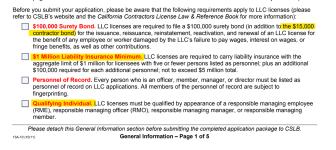Any city or county that requires the issuance of a permit also shall require a written and signed statement from a licensed contractor stating that he or she is licensed, the number of the license, and that it is in full force and effect.
Contractors are required by law to provide this information.
Consumers can contact any CSLB office and request a copy of the pamphlet Consumer Guide to Filing Complaints, which explains the complaint process.
Information also can be found on CSLB's website,
www.cslb.ca.gov, or by calling the toll-free automated assistance number, 1-800-321-CSLB (2752).
How long does a person have to file a complaint?
(B&P Code §7091(a)(b))
For a licensed contractor, CSLB has jurisdiction for up to four (4) years from the date of an illegal act for patent (obvious) defects, and up to 10 years for latent (structural) defects.
(B&P Code §7028(d))
For unlicensed contractors, CSLB has jurisdiction for up to four (4) years from the date of the illegal act.
What kinds of complaints can be forwarded to CSLB for investigation?
Complaints within the Board's jurisdiction involve failure of a licensed contractor to fulfill the terms of an agreement, including poor workmanship; the requirement of a down payment in excess of the amount allowed by law; job abandonment; failure to pay subcontractors or material suppliers; building code violations; use of false, misleading or deceptive advertising; violations of the Home Improvement Act; and violations of the Swimming Pool Act.



